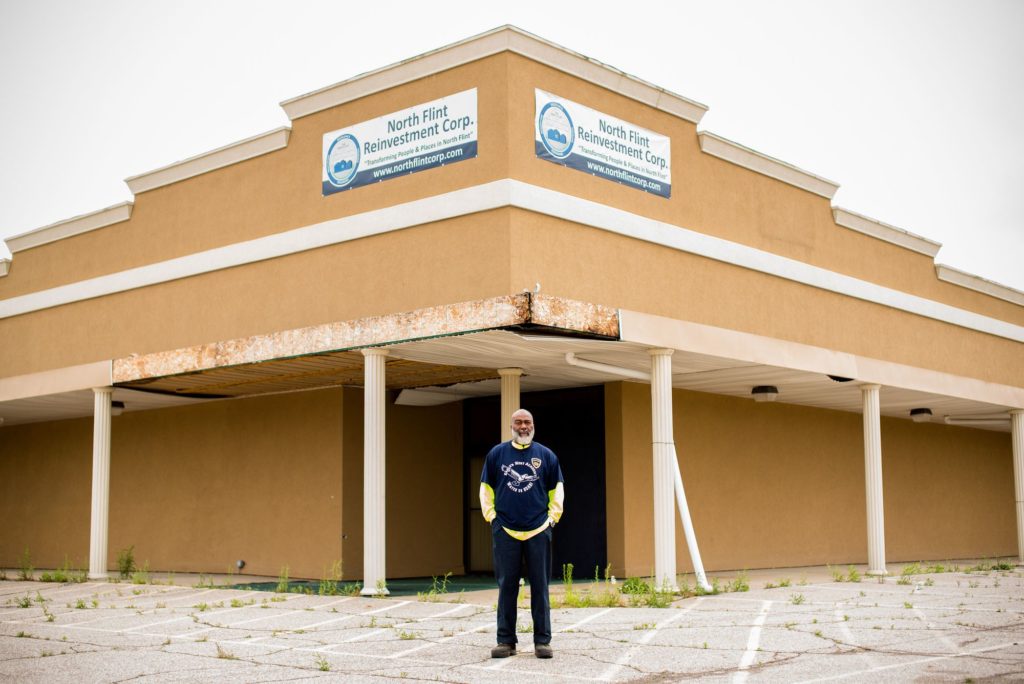The Government Is Here to Help Small Businesses — Unless They’re Cooperatives

![]()
The Government Is Here to Help Small Businesses — Unless They’re Cooperatives – There are still no grocery stores across a wide swath of northern Flint, Michigan, where a Kroger and a Meijer closed after lead was found in the water in 2015.
So Reginald Flynn, a local pastor and community activist, convened a few people in the auditorium of a charter school he runs to talk about starting a grocery store. He wanted to start a cooperative — a community-owned business not bound by the decisions of a huge grocery chain — and began selling shares to neighbors at $250 each. But he still needed more startup money and had no success getting a bank loan.
Then, a city government official told him about the federal Small Business Administration, which guarantees loans to small companies. The local Small Business Development Center — which operates under the SBA’s direction — evaluated Flynn’s business plan and recommended it to a state grant program after concluding the agency could not back it financially. But the agency’s help stopped there.
“We were able to get technical support, but we were not able to get financial support,” Flynn said. “And at the end of the day it’s about the money, baby.”
Now, after years of stitching together a patchwork of tax credits and grants, with nearly 900 member-owners from the community, Flynn has raised nearly all of the $7.6 million he needs to realize his grocery store dream. It could have happened earlier if he had gotten the same type of loan that the SBA guarantees for hundreds of thousands of smaller businesses.
“I think that the SBA could be more beneficial to the community if it opened up opportunities for co-ops to launch their businesses,” Flynn said. “And I think it’s a win-win.”
Cooperative businesses take many forms in the U.S., from worker-owned enterprises to consumer-owned co-ops to Employee Stock Ownership Plans, which function like worker investment funds that own most or all of a company. Following a wave of cooperative startups in the 1960s and ’70s, co-ops have remained a tiny percentage of the U.S. economy, with at least 465 worker co-ops, 200 food co-ops, 1,871 agricultural co-ops, and 6,500 ESOP plans in existence. The case for communal ownership is simple: Instead of siphoning off profits to investors, workers or consumers or both can share in the proceeds, and also have an equal say in how the company is run.
In recent years, rising income inequality, corporate consolidation and a generation of boomer business owners nearing retirement has sparked new interest in transitioning those businesses to worker ownership — or starting new businesses that would be collectively owned from the outset.
The SBA, however, has been far from eager to help. In 2018, Congress passed the Main Street Employee Ownership Act as part of a defense authorization bill, pushing the agency to open its flagship 7(a) loan program to co-ops. Even as the SBA’s then-administrator Linda McMahon expressed support for the concept, Trump administration SBA officials did not change key policies that would have facilitated widespread access. They also failed to implement other parts of the new law, such as a requirement to start a program charged with promoting employee ownership.
The result: Cooperative businesses are still largely cut out of the mainstream financial system that funds new enterprises, making it extremely difficult for them to scale up.
The SBA did not respond to questions by publication time.
“It’s basically defiance of the legislation,” said R.L. Condra, head of government relations for the National Cooperative Bank, which funds co-ops without the SBA’s help. “The agency that’s supposed to support and promote small business, they’re single-handedly shutting down the growth of an entire business sector, and they’ve been doing it for years.”
As the U.S. worked to emerge from the Great Depression, the federal government actually encouraged co-ops, for the same reason they’ve gained popularity today. “Renewed and increased interest in cooperative effort is one of the results of the severe economic hardships of the past few years,” read a 1934 report commissioned by the National Recovery Administration. Minnesota agribusiness giant Land O’Lakes, founded as a dairy cooperative in 1921, is among the largest surviving examples from the first wave of co-ops, along with credit unions and rural electrical cooperatives. The U.S. Department of Agriculture financed many farming co-ops, which were an efficient way for individual farmers to get crops to market, and still does today.
As the economy improved, however, the federal government’s attitude soured. Beginning in the 1960s, regulations interpreting Section 7(a) of the Small Business Act excluded “buying clubs,” then the predominant form of cooperative ownership.
David Thompson, a writer active in the cooperative movement since the 1960s, recalled scraping together enough cash to start a consumer-owned food co-op in Santa Monica, California, in 1974.
“We went to try to get an SBA loan, and found out like every other co-op in the country has for the last 50 years that SBA didn’t want anything to do with co-ops,” Thompson said. “We were not eligible to use their services.”
The grocery store, dubbed Co-opportunity, ultimately launched and is still operating. Many more like it died for lack of financing.
In the Obama administration’s waning days, the SBA initiated a change to its eligibility rules to remove the co-op prohibition. But another rule still de facto excluded them: a requirement that anyone owning more than 20% of a business must guarantee the loan with their personal assets. Without such guarantees, the agency offered no path forward.
Bruce Dobb, a former SBA staffer who now helps co-ops obtain financing as a principal with Concerned Capital, understands why the SBA demands and wants to retain the personal guarantee.
“Having been on the collections side of SBA and repossessed cars and all that stuff, I can tell you, you’re only as brave as your documents allow you to be,” Dobb said. “If you don’t have a personal guarantee, when things go south in the business, they fade into the background pretty quickly and you’re left to your own devices as a loan officer.”
However, a personal guarantee becomes impracticable when there are potentially hundreds of owners, and none of them owns more than 20% of the business. It’s especially difficult in places where co-ops could be most valuable, in low-income communities of color like northern Flint. Co-op boosters envision creating employee-owned home-care agencies, landscaping companies and janitorial services to help low-income people build wealth. Being undercapitalized from the get-go makes long-term success difficult.
“They’re already in poverty,” said Jim Johnson, a co-op consultant. “The whole personal guarantee thing is going to lock them out.”
Having failed to achieve an SBA rule change, co-op advocates worked with Sen. Kirsten Gillibrand and Rep. Nydia Velazquez — both Democrats from New York state, where co-ops are relatively common — to pass the 2018 legislation directing the SBA to “study and recommend practical alternatives” to the loan guarantee requirement, and report back to Congress.
Co-op advocates then presented options to the SBA, pointing out the work done by private funders and some states to make loans available to co-ops without personal guarantees. Most of these funds report minimal losses, a success that the funders attribute to intense borrower counseling, which they suggested could be made a condition of receiving a 7(a) loan. The SBA also considered whether it should revive an old pilot program used to fund underserved businesses via nonprofit intermediaries, or impose covenants that would bar distribution of profits until the loan had been repaid.
Discussions with the agency were sometimes contentious, according to co-op industry representatives. During a 2018 meeting, then-associate administrator William Manger, who was in charge of the 7(a) program, made clear that he would not waive the personal guarantee requirement and stormed out of the meeting room, according to one participant. (Manger, who has since left the agency, did not respond to a request for comment.)
Ultimately, the SBA released a report rejecting all alternatives as incompatible with its responsibility to ensure loan recovery. “They circled back and said, ‘We’re not doing anything,’” said Alison Lingane, co-founder of Project Equity, a nonprofit that promotes employee ownership. “It was like, ‘OK, we’re required to do it, but we don’t actually want to, so we’re going to go through the motions.’”
Unhappy with the SBA’s conclusion, the co-op industry called for an oversight hearing by the House Small Business Committee. A hearing took place in February 2020, but no SBA representatives testified.
Instead of waiving the personal guarantee, SBA said it would educate the public about the two existing paths for co-ops to win SBA financing. First, if a loan is to cover a business’s transition to employee ownership, the original owner could guarantee the loan until it is repaid. Or borrowers could set up a separate entity with enough assets to guarantee the loan rather than co-op members being on the hook themselves.
In 2020, a food co-op in Fredericksburg, Virginia, became the first consumer co-op to win funding under the second SBA exception. But capitalizing an entity that could serve as a guarantor required raising $1.7 million in loans and grants and setting aside another $150,000 in cash collateral, which residents of most lower-income neighborhoods couldn’t hope to replicate.
“It was a great case study to prove the point that it is a path, but I think it sets up the public sector to fail on their obligations to our communities,” said Micha Josephy, who runs the Cooperative Fund of New England. “When you’re trying to support low-wealth co-ops, we haven’t figured out how to make it work.”
The legislation has proven marginally useful for ESOPs, for which a personal guarantee isn’t required. One of them, an auto recycling business in Rhode Island, closed the first SBA-backed ESOP loan in 2019, despite requirements that are still more onerous than they are for regular businesses. The SBA still doesn’t allow an ESOP applicant to go through the normal system of banks that have the authority to underwrite SBA loans, for example, even though Gillibrand and Velazquez wrote a sharply worded letter to the agency saying this policy contravened their intent. The ESOP also has to get two separate valuations for the transaction, which creates problems if they differ.
Ralph Stone, who runs a boutique investment banking firm that facilitated the first ESOP 7(a) transaction and has several more in the works, said it requires persistence.
“I think the issue was ‘This is too difficult, what do I need to do this for, I got enough on my desk,’” Stone said of the SBA’s slowness to allow employee ownership transactions. “It’s easier to say no than it is to say yes.”
But co-op advocates say that the rules will continue to bar most co-ops from accessing the 7(a) loan program, and thus keep the sector from growing. That’s because their success also relies on the banks that SBA depends on to originate 7(a) loans — financial institutions make the most money if they can process a high volume of standardized applications, and anything complicated cuts into their profits.
Another part of the 2018 law was supposed to help by directing the SBA to facilitate coordination among its nationwide network of Small Business Development Centers to promote employee ownership opportunities, getting companies loan-ready and educating bankers on the process. But SBA headquarters has taken no steps to do so, forcing motivated staffers within some SBDCs to step up on their own.
“We requested the ability to form some kind of entity, and met brick walls until recently,” said Frank Cetera, a senior business advisor with the Onondaga SBDC in upstate New York, who has set up a working group to educate business owners about the possibility of selling to their employees. One such business, a 100-year-old lumber company, got a grant from New York state to make the transition, but no help from the SBA’s loan programs. A bill recently introduced by Democratic Sen. John Hickenlooper of cooperative-friendly Colorado would order the SBA to ease lending to employee-owned companies, since the nudging approach didn’t work.
“I don’t think most people are going to try until the SBA actually changes its policies to allow for it,” Cetera said.
The Government Is Here to Help Small Businesses — Unless They’re Cooperatives








Responses